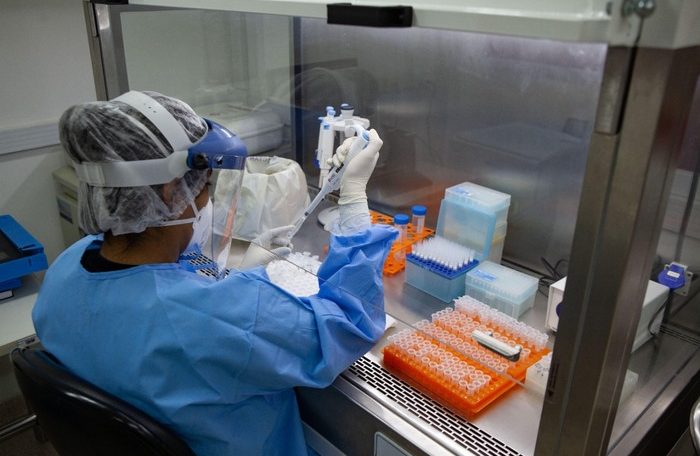
 |
|
| Photo: Miwa Filho / SEI. |
The results of new genetic sequencing of samples positive for COVID-19 indicated that the P.1 variant of the new coronavirus is the strain that currently prevails in Pernambuco. The analysis, carried out by the Aggeyu Magalhos Institute (IAM/Fiocruz PE) and the Keijo Asami Immunopathology Laboratory (LICA/UFPE) at the request of the State Health Department (SES-PE), also indicated that there is no prevalence. Presently, from strain B.1,617, initially reported in India. This Friday (06/04), a new round of sequencing, especially with the cases of Agreste, will continue so that it is possible to continue the analysis of the epidemiological profile of the disease in this region, which is experiencing a strong acceleration of the epidemic. Used to be. . Results should be out in the next few days.
In all, of the surveys released this Friday (06/04), 233 samples were analyzed – 141 tests from patients diagnosed between January and April this year, indexed by Fiocruz PE, and tested positive for the disease in May. 92 biological samples, from those confirmed to have been diagnosed with HIV, were analyzed by LIKA. Of the total tests sent, 37 were of people residing in municipalities located in the state’s Agrest region.
“We know the importance of genomic surveillance of Covid-19 to halt the progression of the virus and create an epidemiological panorama of the disease in the state. Sequencing of these samples is essential to understand the different strains of the new coronavirus. How is the circulation of is in Pernambuco, especially in Agreste, which is passing through a critical moment. In this way, we will be able to think of new strategies to fight the epidemic. However, it is important to emphasize that That surveillance with respect to variants should be reinforced primarily by the federal government, responsible for the inspection of ports and airports, the main gates for variants”, insists the Secretary of State for Health, Andre Longo.
Of the samples sequenced in LIKA, of all patients collected material for disease detection in the last month of May, 46.3% were of the P.1 type, followed by 23.2% and 20 of the B.1 type. 7% of the P1.1 variant. The B1.1.28 variant represented 3.7% of the samples, while the B1.1 variant accounted for 2.4%. Variants P2, B1.2, and B1566 corresponded to 1.2% each.
“The P.1 variant, which was first reported in the state of Amazonas, is of great concern. This type of predominance in sequencing samples from patients living in the Agreste region of Pernambuco has been associated with population behavior in recent weeks. This may point to one of the reasons for the acceleration of the disease in this region. Studies show that we need to be vigilant and continue active surveillance in the coming days”, explains Longo.
At the Aigeu Magalhos Institute, of the samples referring to the month of January, 76% were classified as P.2 and 5% as P.1. Of the February exams, 58% were classified as P.1 and 40% as P.2. In the March analyses, 87% were identified as having the P.1 variant and 11% of them were identified as having the P.2 variant. All were classified as P.1 in the analysis for the month of April.
Surveillance – The state health department is continuously monitoring the spread of the virus in Pernambuco, through partnerships with scientific institutions such as the Institut Aigue Magalhos and Laika. Last April, following genetic sequencing, five biological samples from Pernambuco that were confirmed for COVID-19 had already presented the P.1 variant of the disease. Periodic work of analysis of biological samples of Kovid-19 positive patients is done by taking samples from many areas and municipalities of the state.
The Government of Pernambuco requested support from the Ministry of Health to expand genomic surveillance, expediting genetic sequencing of samples from the region. The state is awaiting a position from the federal agency.



